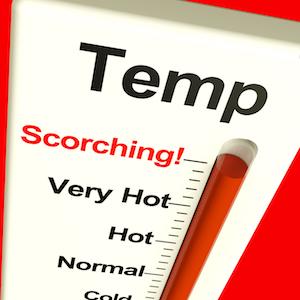Everybody hates heat waves. We hate them so much, in fact, that heat waves have a measurable detrimental impact on our society.
For starters, tempers tend to flare during heat waves. People become more aggressive and violent. As a result, crime increases as well. In general, people feel miserable and take their frustrations out on others.
Given these observations, it seems natural to wonder if people who suffer from mental illness have a more difficult time during heat waves. So a team of British researchers analyzed the literature and published a systematic review of the topic in the journal Public Health. Their analysis, which examined the impact of high temperature on adverse mental health outcomes (such as suicide or the exacerbation of symptoms among schizophrenics), included the results of 35 studies.
Suicides Increase During Heat Waves
The team's most important finding involved suicide. Of the 17 studies they included which examined suicide, 15 showed a link between higher temperature and suicide frequency. Specifically, for every 1o C. increase in temperature, the risk of suicide also increased by 1% to 37%. Though the association was weaker, the studies also found that suicides tend to be more violent as the weather gets warmer.
The rest of their findings are summarized in the chart below. In general, heat tended to exacerbate previously existing mental illness, such as worsening the symptoms experienced by schizophrenics and causing more agitation in dementia patients. There was also an increase in mortality due to alcohol and drug misuse.

This study has serious implications. Usually, when a heat wave arrives, the media rightly warns the public to check in on elderly people, children, and pets. But, clearly, they aren't the only ones vulnerable to the effects of extreme heat.
People who are depressed and/or suicidal, as well as those suffering from other mental illnesses, also should receive special attention. And because the homeless population is disproportionately afflicted with mental illness and addiction, public health officials would be well advised to take extra precautions.
Source: R. Thompson, R. Hornigold, L. Page, T. Waite. "Associations between high ambient temperatures and heat waves with mental health outcomes: a systematic review." Public Health. Published online: July 2018. DOI: 10.1016/j.puhe.2018.06.008




